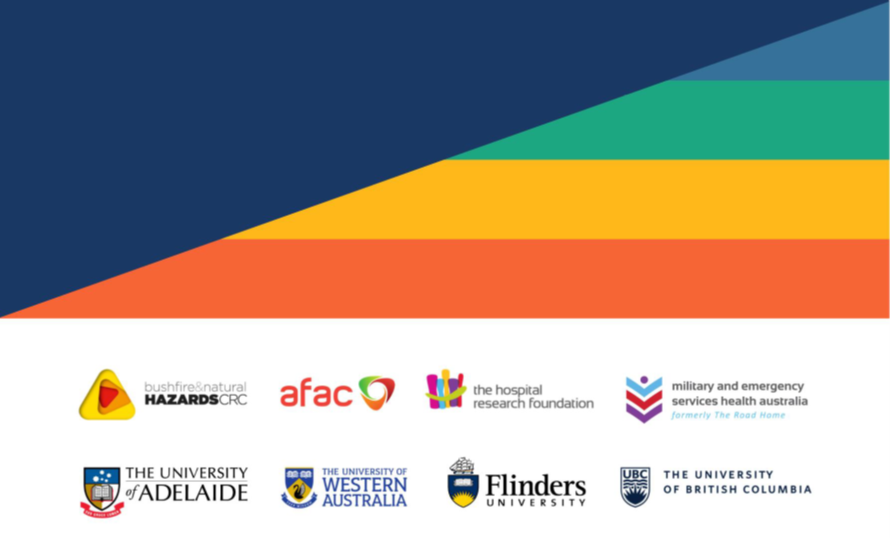
PUBLICATIONS
Published works

Positive mental health in young adult emergency service personnel
| Title | Positive mental health in young adult emergency service personnel |
| Publication Type | Report |
| Year of Publication | 2021 |
| Authors | Taylor, A, Cocks, J, Lawn, S, Lawrence, D, Rikkers, W, Roberts, L, Ashe, M, McFarlane, A, Roberts, R, Delfabbro, P, Caruso, H, Van Hooff, M |
| Document Number | 675 |
| Pagination | 107 |
| Date Published | 06/2021 |
| Institution | Bushfire and Natural Hazards CRC |
| City | Melbourne |
| Report Number | 675 |
| ISBN Number | 978-0-6452058-0-0 |
| Keywords | emergency service, mental health, personnel, volunteers, young adult |
| Abstract | Overview Fire and emergency service personnel, particularly those who volunteer, contribute in innumerable ways to their communities and to Australian society more broadly. Engaging in such a role brings the benefits of connecting with like-minded others and a valued sense of contributing to the community, benefiting mental health and wellbeing (Son & Wilson, 2012). Concurrently, however, fire and emergency service personnel are more likely than the general population to be exposed to potentially traumatic events (PTE), are at higher risk for developing mental health conditions, and are at two-fold increased risk of suicidal ideation (Beyond Blue Ltd., 2018). Therefore, maintaining good mental health for personnel is increasingly recognised as an integral part of the sustainability of the fire and emergency services. Maximising the productivity and retention of younger early-career volunteers is particularly important, given that over half of the current volunteer force across many emergency services (ambulance, fire and rescue, state emergency service) exceeds 55 years of age (Beyond Blue Ltd., 2018). To ensure the sustainability of the fire and emergency services broadly and the volunteer force more specifically, recruitment and retention of younger volunteers is imperative. While numerous individual, social and organisational factors have been identified as contributing to mental health and, thus, the sustainability of volunteering, mental health support frameworks, along with research and resources for the mental health of fire and emergency service personnel have focused on outcomes across the age range and length of service (Varker et al., 2018), with limited consideration given to developmental factors that may impact initial uptake and engagement. In particular, emerging adulthood (the period between ages 16–25 years) is recognised as a specific phase of development that has its own particular constellation of psychosocial and demographic correlates (e.g., identity exploration and openness to possibility; Arnett, 2000). Australian young people tend to access support for mental health difficulties through different means than traditional face-to-face mental health services or programs, including from peers, parents and sourcing information regarding mental health online (Mission Australia & Black Dog Institute, 2017). Uptake of formal mental health programs (e.g., school counselling) can also be limited (Rickwood et al., 2007). Thus, a ‘one size fits all’ approach to mental health across emergency service personnel may not be acceptable to the younger adult cohort. Of concern, younger volunteers were reported in the AtC study into the mental health of fire and emergency responders in Australia to have higher levels of self-reported psychological distress and lower levels of resilience than older volunteers (Beyond Blue Ltd., 2018). Early intervention is recognised as an essential approach for preventing and minimising mental health conditions (McGorry & Mei, 2018). The present research project was developed in response to a call to action from agencies that the Australasian Fire and Emergency Service Authority Council develop data-driven approaches for supporting mental health, aligned with best practice guidelines and targeted specifically at young fire and emergency service volunteers, supported by practical guidance to agencies for implementing these approaches. Project Aims and Objectives The overall aim of the project was to understand what can be done at an individual, local and organisation-wide level to minimise the short- and long-term impacts of potentially traumatising events and to support and promote good mental health and wellbeing for young adult (16–25-year-old) volunteers in emergency service organisations. Specific objectives for the project were as follows:
This report presents information and outcomes for these objectives and provides recommendations for agency-based implementation of the proposed Wellbeing Framework for Young Fire and Emergency Service Volunteers. The outputs of this project are informed by data from this cohort and are aligned with the available evidence for best practice in relevant contexts. It is hoped that the framework and its associated implementation guide will assist agencies in providing informed psychosocial support for the mental health of their young volunteers, thereby contributing to the sustainability of the volunteer service among fire and emergency service agencies. Please note that key terms used throughout the report are defined in the Glossary (Chapter 12). |
| Refereed Designation | Refereed |
| Full Text | Access the mental health and wellbeing resources, including the Care4Guide, posters and social media assets, here. |
Published Works


